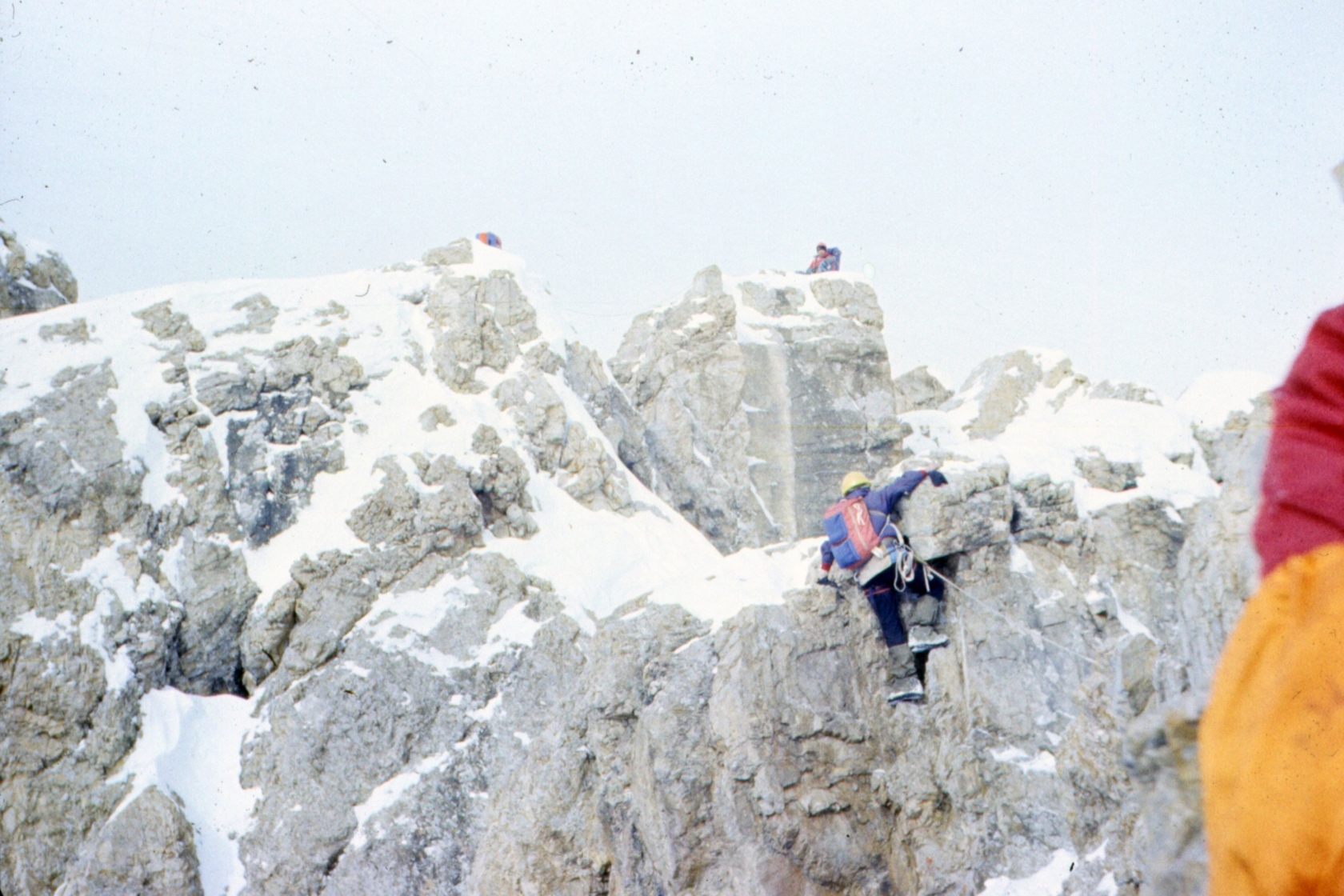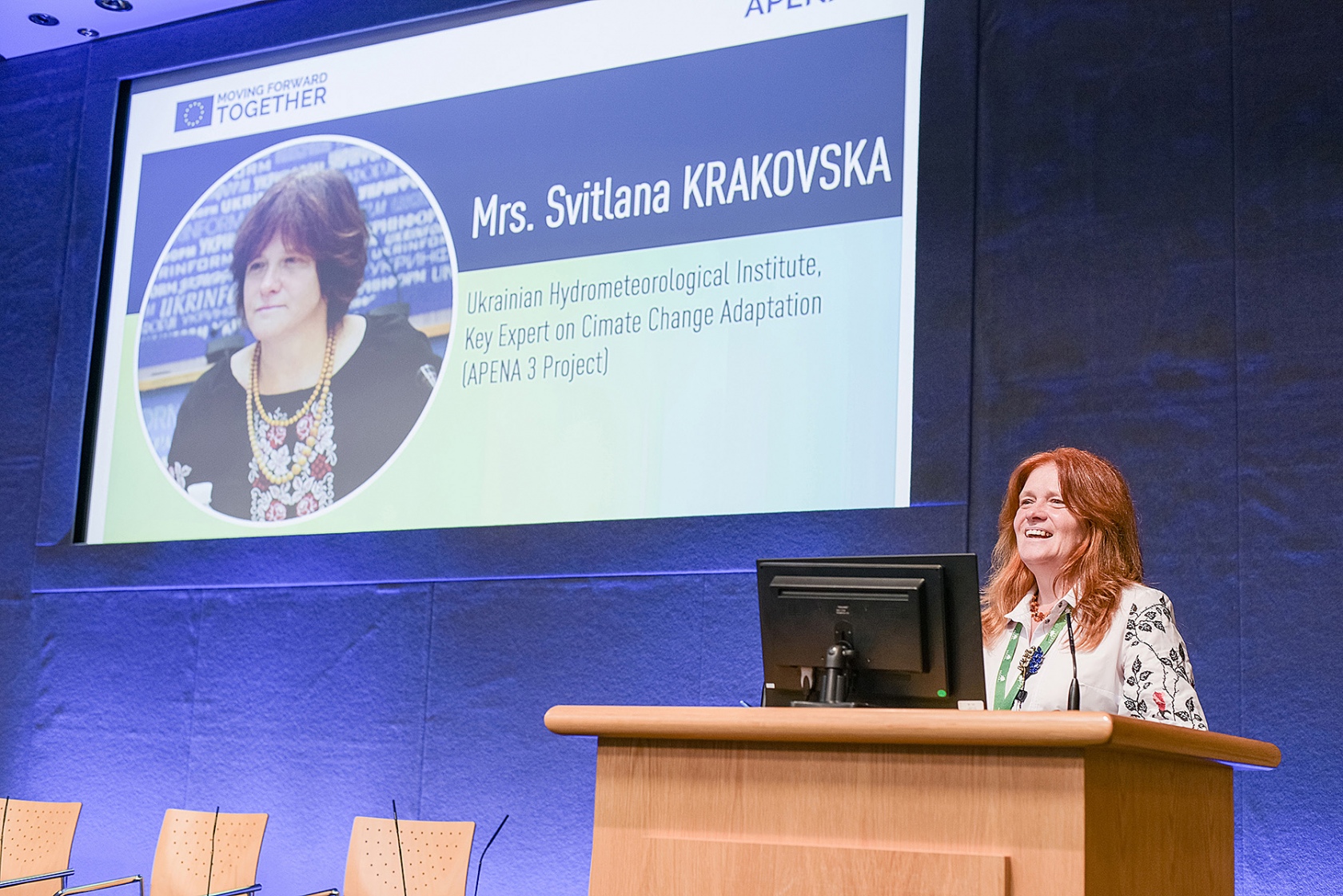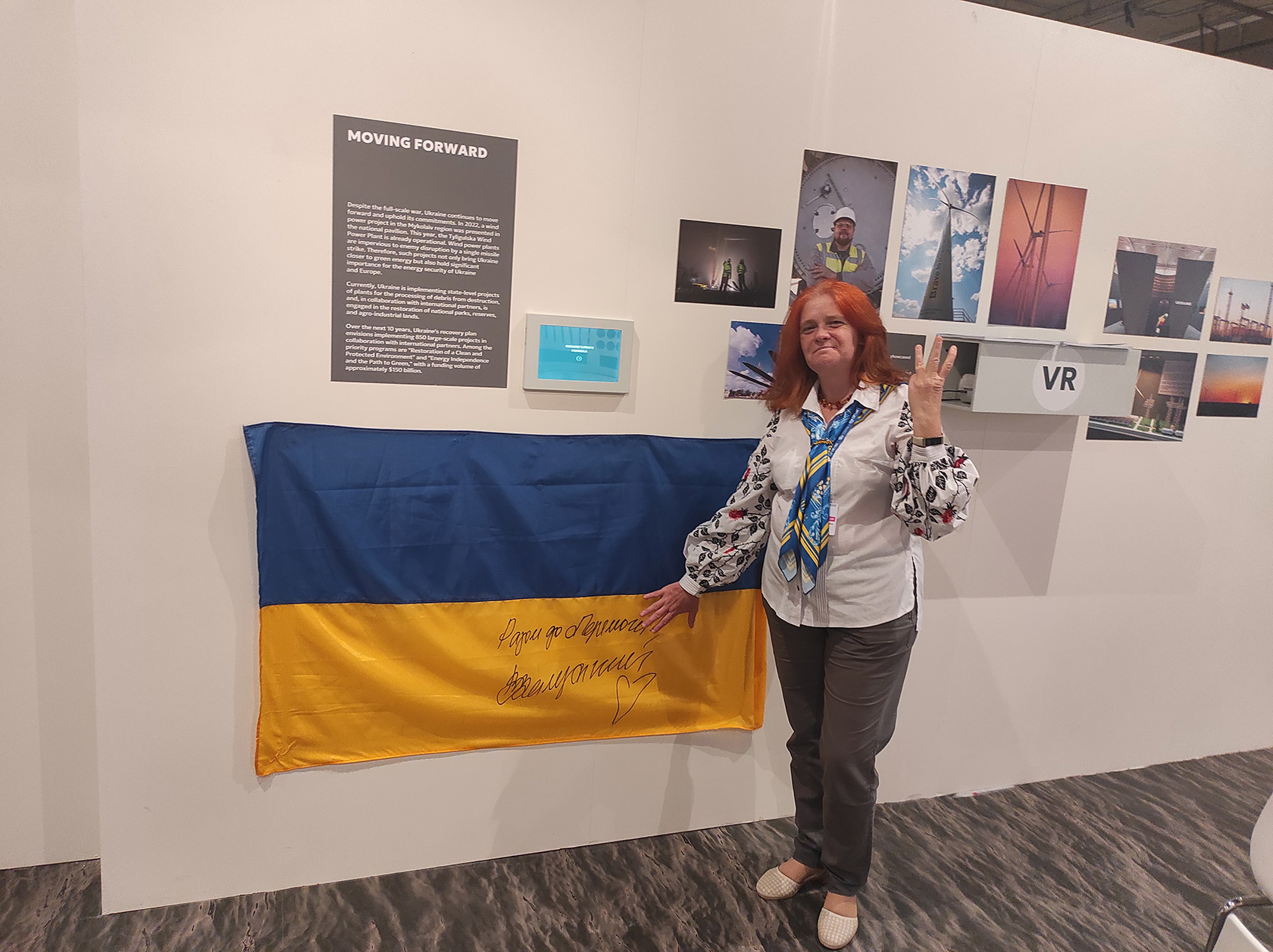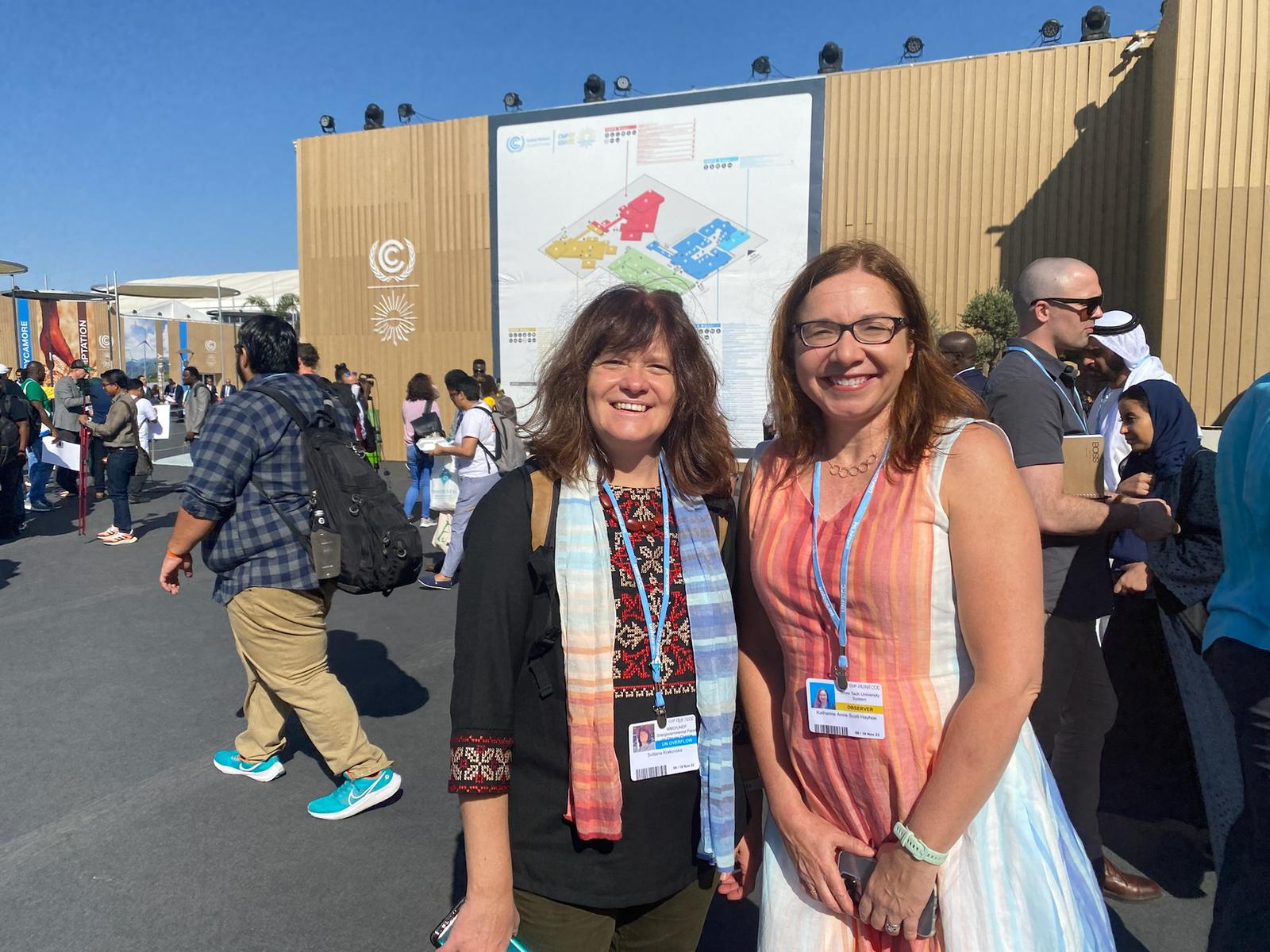"It is too late to save everyone". Climatologist Svitlana Krakovska on climate issues, war, and the bar that Ukraine sets for the world

"We are all inside a train that is headed towards an abyss. There are firemen in the locomotive who continue to shovel coal into the firebox. And there is also a restaurant car where people continue to live normal lives as if everything is fine.
However, there are also those who are looking out of the window and see that the abyss is ahead. They start talking: "People, we need to stop. Or at least stop those who keep shovelling coal", says climatologist Svitlana Krakovska.
– "As a scientist, I feel as if I am in that exact position. I can’t persuade people intent on sitting in the restaurant car continuing to live as they did before because they don’t care. But it doesn’t mean we can get away with not applying the brakes."
Svitlana Krakovska is undoubtedly the most prominent figure in the Ukrainian climate science field. She leads the applied climatology laboratory of the Ukrainian Hydrometeorological Institute.
And she is likely one of the most famous modern scientists worldwide. Since 2013, she has represented Ukraine on the Intergovernmental Panel on Climate Change (IPCC). In 2022, the scientific journal Nature included her on a list of the world’s ten most influential scientists, in no small part due to her continued representation of Ukraine on the international science stage throughout the full-scale Russian invasion.
Svitlana Krakovska graduated from the Leningrad Hydrometeorological Institute in 1991, the year the Soviet Union collapsed. During her studies she took up mountaineering, a pursuit which would take her all around the USSR to the Urals, Chukotka, Kamchatka, Karelia, Central Asia, and of course the Caucasus range.

After returning to Ukraine, Svitlana joined the second expedition to the Academician Vernadskyi Antarctic station. There, she met her future husband, with whom she would later have four children.
Because of her trips to the most beautiful yet inhospitable places on the planet, Svitlana knows the destructive power of nature not only from her course material, but also from firsthand experience. Once, a mudslide in the mountains almost took her life. During a winter trip in Crimea, she had her toes frostbitten. And on a climbing trip in the Fann Mountains of Tajikistan, she was "benighted", that is, forced to endure an unexpected overnight stay, in mountaineering terminology – in cold weather at the altitude of four and a half kilometres.
"Honestly, the longing I felt then for sunrise…", recounts Svitlana, omitting the predictable follow-up statement along the lines of "I’ve never waited so intently for something in my life" to switch to another story. It is evident that she has a practically endless repertoire of these stories.
And because of her trips, she experienced the world as it once was. Fresh photographs from Antarctic show her how glaciers, where she walked on less than thirty years ago, have shrunk.
Why this is happening can only properly be explained through mathematical models and physical principles that accurately describe the current situation and forecast future trends. However, these figures and statistics are almost incomprehensible to the majority of the population. This is why the scientist frequently employs analogies involving things like "locomotive firemen", "restaurant cars", and "stage-four cancer".
We met with Svitlana Krakovska in the offices of one of her employers, namely Egis Ukraine, a branch of an international construction consulting and management firm with an environmental focus. Here, she is a key expert on a climate adaptation strategy project called APENA 3, and is responsible for its development in the three oblasts of Ukraine that have been chosen as the pilot regions.
During her interview with Ukrainska Pravda, Svitlana brought up, among other topics, the role of war in the climate crisis, how cults use the topic of climate in their rhetoric, and how the Ukraine of today can help a reeling world.
The complete interview with the scientist is provided below.

Covid. War. Climate
One of the tasks I dealt with at the IPCC was connected to the COVID-19 pandemic. In 2020-21, emissions of atmospheric pollution saw a significant decrease of approximately seven percent. To be honest, that’s not much, but earlier they were always on an upward trend.
And we needed to understand whether that would make any impact on the climate. The answer turned out to be "no", because the climate system is based on the principle of inertia. If [the warming] accelerates, it is impossible to stop it abruptly.
However, I saw a silver lining in the COVID-19 pandemic. It was that human society isn’t as inertial as I once thought. When one’s life is threatened, people are capable of changing quickly. They agreed to wear masks, refrain from non-essential travelling and stay home if doing so could save a life.
When it comes to the current war between Russia and Ukraine, it significantly decreases our chances of fighting climate change on a global level. Now, lots of resources are being spent on defence. It is understandable for people to be concerned about safety, and the threat of conflict here and now outweighs future threats connected to climate change.

"Are you safe?"
During the first months of the full-scale invasion, I sometimes gave five interviews a day to foreign journalists. Every conversation started with the question "Are you safe?", which would leave me speechless. I started thinking about how to respond to it correctly rather than just saying "yes". I decided to respond as a mathematician would.
I told them that the probability of me dying during the current interview is small. The probability of somebody in general dying in Kyiv is significantly less than for people currently located somewhere in the East, closer to the combat zone. But at the same time, the probability of dying is significantly higher than for people abroad.
However, it seems to me that people in Ukraine have learned to live accounting for this possibility of being killed. Of course, unlike me, the majority of people have done this subconsciously.
At the international events where I represented Ukraine, I saw the way people fell silent during my speech. They were expecting me to divulge some kind of panacea for living under pressure, wondering how we manage to keep things going at all.
I realise that even we probably don’t truly understand how we do it. Still, the war has taught us to live under conditions of stress and uncertainty. Soon, many others on this planet will be forced to live under similar conditions due to extreme weather phenomena.
What is happening in Ukraine now is something of a vaccination for humanity against future climate disasters.
"I asked for weapons for Ukraine"
Apart from an analogy about a train, I have one more about a boat. Imagine if a fast-flowing river brings the boat to the crest of a waterfall. We all paddle with the last of our strength, and notice potential salvation in the form of a coast or island that we could reach if we try hard enough. However, one big guy in the boat stands up and, instead of paddling, starts beating up the people next to him.
Then a question arises: what should the others do? The problem is that it is impossible to throw this man out of the boat. Imagine him as a cancerous tumor that cannot be removed; the only thing that can be done is to isolate it from the rest of the organism. This is why the man should be tied up so that he can’t move.
To return to reality from our parallels, in Ukraine, we know how to tame a neighbour. However, we need weapons. That is why, during my meetings with delegates in the European Parliament, I asked for weapons for Ukraine, even though my specialty is climate science.
The rest of the world shall paddle whilst we tame this man. Otherwise, everyone will be in trouble.

Worse than terrorism?
Some years ago, my interview was released with a headline that claimed that "ignoring the issue of climate change is worse than terrorism". It really was my conviction because at that time I could not imagine that a terrorist state would arise and be capable of harming humanity to the point comparable to a climate disaster.
Instead, I clearly understood that if because of a climate change hurricane category increases by half a degree, then it will lead to a significantly bigger number of human casualties than any terrorist act that I could imagine at that time.
[Russia’s destruction of the] Kakhovka [dam] showed us the consequences of destroying a dam. However, to be honest, glacial outburst floods - the destruction of natural dams resulting from melting glaciers overfilling glacial lakes - have the potential to cause significantly more destruction and loss of lives. Such disasters threaten millions of people in Asia.
800 million people live on the coasts of the world’s oceans. They are threatened with ever-stronger storms due to climate change.
Droughts and fires may lead to an increase in forced migration, something we are already familiar with in Ukraine. Climate change is happening here and now. It is an illness that is already symptomatic.
To continue with the medical analogies, we are likely already at the fourth stage of cancer. However, this doesn’t mean treatment would be futile.
I believe that humanity can change. However, it is already impossible to save everyone.
Nobel climate sceptics
I am surprised to hear a widespread statement like "97% of scientists agree that climate on the planet changes because of humans". It is used to persuade climate sceptics that they are wrong.
As a matter of fact, scientists, similar to doctors, have their own specialty. That is why a person with heart illnesses will not consult a dentist to resolve one’s issues. Similarly, there are scientists that specialise in archaeology, geology or climatology.
And among climatologists, there are none who will discount the role of humans in climate change. Otherwise, they either wouldn’t have become a climatologist, or their position [as certified climate scientists apparently espousing denialist beliefs] may have been bought [by entities with a vested interest in preempting more stringent environmental legislation]. This even happens with scientists who are Nobel laureates; if you look up the accomplishment that earned them the prize it turns out to be in the field of semiconductors, for example.
I was shocked when one such Nobel laureate provided his arguments and said that IPCC stated that global temperature rose by 0.8 degree (today this indicator rose by 1.1°C – UP). He suggested the following: "Let’s convert this into an absolute temperature in Kelvin scale and calculate the percentage of temperature change". It turned out that the change was only by a small part of the percentage, meaning that the change was rather small.
It should supposedly sound as a serious argument. However, we are talking not only about the temperature of the planet's atmosphere, but about temperature conditions in which a person lives. And they are within a very small range where 0.8 degree is already too much.
Climate sceptics similarly laugh about the news that concentration of some gas changed only by tens of particles per million (one thousandth part – UP). I say the following: "If it seems like too little for you, try drinking a couple of per mille of something like cyanide. Or ingest some virus: the concentration is small that is why probably it will not do harm to you, right?".

Cult
Sometime in 2015, two correspondents came to our institute for the Open Day. They were very concerned about the issue of climate change. Me and my colleague Vira Balabukh spoke for two hours about what was going on in the world.
They were very surprised when we started talking about the fact that climate change is caused by humans. In response, they said that they prepared some kind of report where, for the first time in history, exactly what was going on with the climate would be explained. Of course, it sounded extremely strange for us because the IPCC has been dealing with these issues since 1988. However, it proved impossible to persuade these journalists.
As a result, nothing came of that interview, and I might have even forgotten about it had I not later been approached by Valerie Masson-Delmotte, co-chair of the first working group of the IPCC and she asked to check journalists from Ukraine who had reached out to her for comment. It was rather unusual, because I was a representative of the IPCC in Ukraine but they wanted someone not from the country. I started digging and then found out about the existence of the Creative Society.
In its activity this sect exploit the topic of climate change. They say that "we are all going to die" and regarding this, they are not far from the truth. However, they strongly reject the connection between human activity and the climate crisis. They say that everything can be explained entirely by natural causes, either astronomical factors or geological processes.
They have a man who is supposedly an "advisor to the Pentagon" (which is false), who claims that the planet’s temperature increases because of volcanic activity. So I’d like to say that he isn’t a scientist at all. Large volcanic eruptions instead cause temporary cooling. And the other explanations they provide for climate change are similarly nonsensical.
They therefore promote the idea that fossil fuel use has no impact on climate. This is unsurprising when you consider the fact that the Creative Society has Russian roots (The Creative Society is linked with the AllatRa cult – UP).
On the other hand, there are counterexamples of religious organisations contributing to the fight against climate change. The American scientist Katharine Hayhoe, my colleague, works with priests and explains to them what is going on with the climate and how we can deal with it. They, in turn, relay the information to their communities. Priests have authority in the USA – this is why the approach works.
By the way, Katharine has Ukrainian roots. She is a true fighter for the climate cause and if you are interested in this topic, I recommend following her on social media.

"Make some TV series"
Once, I was invited on TV and the last question I was asked was "What should we do?" As in, how could the interviewers contribute to the fight against climate change. I replied "Make some TV series", and they were blindsided by the response.
Today, we can’t imagine life without refrigerators. However, at one time people had little use for them and manufacturers didn’t know how to advertise them. Then they began showing them in other contexts to raise awareness of the refrigerator’s existence and the quality-of-life improvements owning one can bring.
Everyone should do as much as they possibly can in their current position. If the characters on a TV series install solar panels, then sooner or later viewers will follow their example. We need to promote ideas that will help slow down the climate disaster.
I am one of those who insists that in IPCC, we will involve psychologists to find mechanisms to explain to people that they must act now rather than threaten them with urgency.
Dmytro Simonov
Editing: Ben McBride, Ivan Zhezhera
